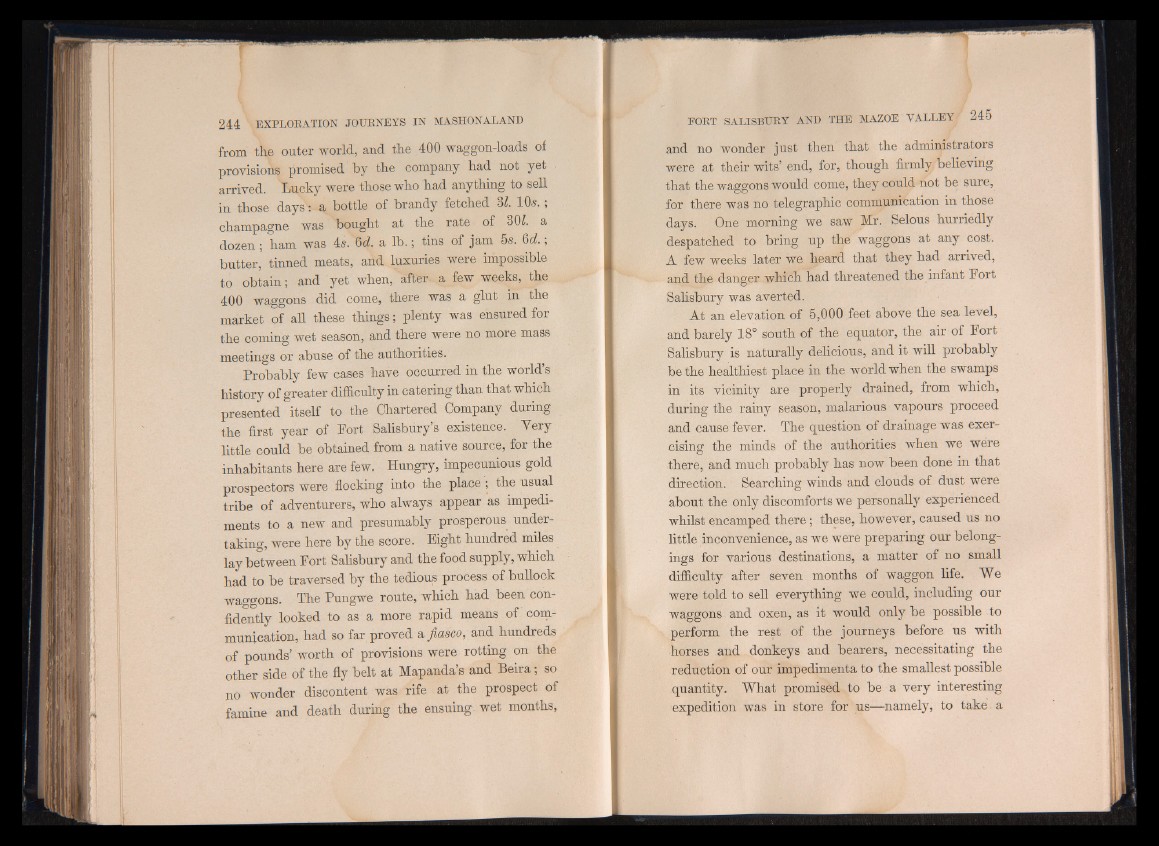
from the outer world, and the 400 waggon-loads of
provisions promised by the company had not yet
arrived. Lucky were those who had anything to sell
in those days : a bottle of brandy fetched 31. 10s, ;
champagne was bought at the rate of 301, a
dozen ; ham was 4s. 6d. a lb. ; tins of jam 5s. 6d. ;
butter, tinned meats, and luxuries were impossible
to obtain; and yet when, after a few weeks, the
400 waggons did come, there was a glut in the
market of all these things ; plenty was ensured for
the coming wet season, and there were no more mass
meetings or abuse of the authorities.
Probably few cases have occurred in the world’s
history of greater difficulty in catering than that which
presented itself to the Chartered Company during
the first year of Fort Salisbury’s existence. Yery
little could be obtained from a native source, for the
inhabitants here are few. Hungry, impecunious gold
prospectors were flocking into the place ; the usual
tribe of adventurers, who always appear as impediments
to a new and presumably prosperous undertaking,
were here by the score. Eight hundred miles
lay between Fort Salisbury and the food supply, which
had to be traversed by the tedious process of bullock
waggons. The Pungwe route, which had been confidently
looked to as a more rapid means of communication,
had so far proved a fiasco, and hundreds
of pounds’ worth of provisions were rotting on the
other side of the fly belt at Mapanda’s and Beira ; so
no wonder discontent was rife at the prospect of
famine and death during the ensuing, wet months,
and no wonder just then that the administrators
were at their wits’ end, for, though firmly believing
that the waggons would come, they could not be sure,
for there was no telegraphic communication in those
days. One morning we saw Mr. Selous hurriedly
despatched to bring up the waggons at any cost.
A few weeks later we heard that they had arrived,
and the danger which had threatened the infant Fort
Salisbury was averted.
At an elevation of 5,000 feet above the sea level,
and barely 18° south of the equator, the air of Fort
Salisbury is naturally delicious, and it will probably
be the healthiest place in the world when the swamps
in its vicinity are properly drained, from which,
during the rainy season, malarious vapours proceed
and cause fever. The question of drainage was exercising
the minds of the authorities when we were
there, and much probably has now been done in that
direction. Searching winds and clouds of dust were
about the only discomforts we personally experienced
whilst encamped there; these, however, caused us no
little inconvenience, as we were preparing our belongings
for various destinations, a matter of no small
difficulty after seven months of waggon life. We
were told to sell everything we could, including our
waggons and oxen, as it would only be possible to
perform the rest of the journeys before us with
horses and donkeys and bearers, necessitating the
reduction of our impedimenta to the smallest possible
quantity. What promised to be a very interesting
expedition was in store for us—namely, to take a